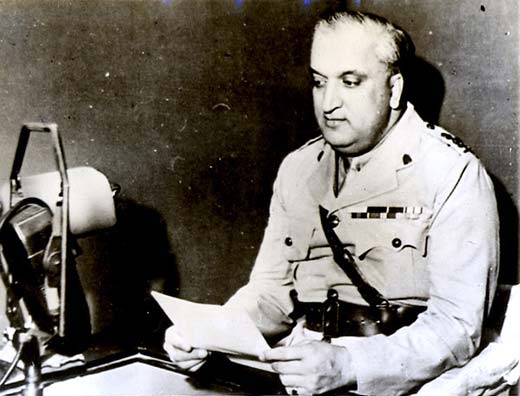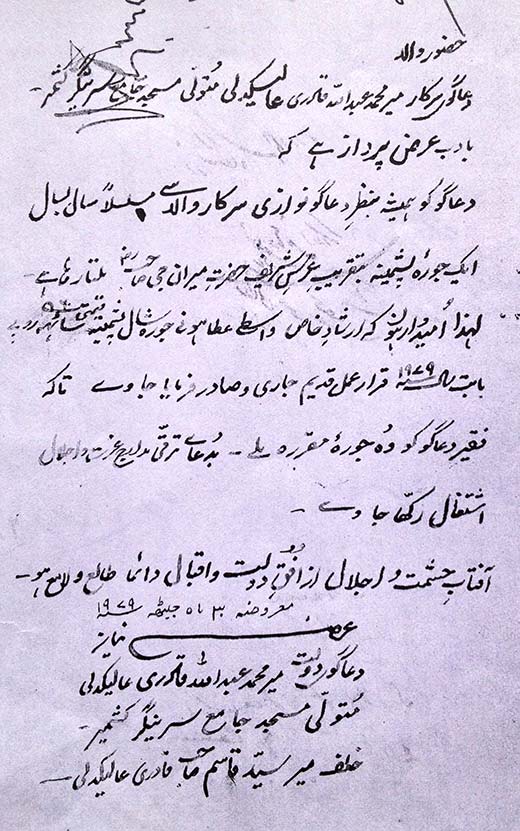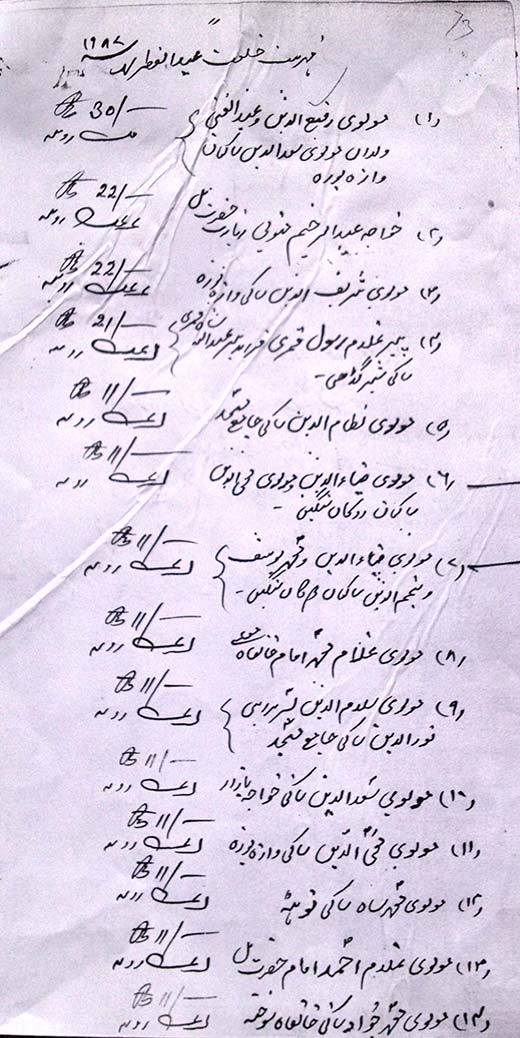Many tools were employed by Hindu Rulers to manage Muslim subjects. One of them was the Muslim clergy. Khalid Bashir Ahmad details the largesse that Hari Singh approved for Srinagar’s Moulvis and Muftis in 1931
 Apart from using an iron fist to perpetuate their hold on their subjects, the feudal systems also roped in clergy to generate soft feelings among the people towards the rulers. On their part, the rulers kept the clergy in good humour by extending incentives including periodic cash doles.
Apart from using an iron fist to perpetuate their hold on their subjects, the feudal systems also roped in clergy to generate soft feelings among the people towards the rulers. On their part, the rulers kept the clergy in good humour by extending incentives including periodic cash doles.
In a religiously minded society like Kashmir where the clergy commanded respect and obedience, the Dogra rulers tried to keep it on their right side. They annually distributed khillats (grants) among the moulvis and muftis. The distribution of grants, however, was subject to the specific condition of loyalty and devotion to the ‘Throne and Person of His Highness the Maharaja Bahadur’. Strange as it may appear, when the Muslims of Kashmir were up against the autocratic and oppressive rule of the Dogras, many of their moulvis were harvesting the fruits of loyalty to the oppressor!
On Id ul Fitr, the annual Muslim festival celebrated as thanksgiving on the culmination of the fasting month of Ramadhan, Pratap Singh and Hari Singh issued khillats valuing Rs 203 and Rs 255 and Annas 8 annually to the moulvies and muftis of Jammu and Srinagar, respectively.
In return, these religious figures, who led prayers and delivered sermons to the faithful, would pledge, often in writing, their loyalty to the ruler. The grant would be stopped if the recipient was found violating the laid down condition. To ensure that the moulvis behaved and did not violate the loyalty provision, a strict watch was kept on their movement and where a recipient was found violating loyalty the police would immediately report upon him and the khillat was stopped. If there was delay in the disbursement of the grant, the recipients would make a written request to the government for its early release.
The caretaker of the Jama Masjid, Mir Mohammad Abdullah Qadri Aalikadali, in a written representation made on 30th Jaith 1979 Bikrimi [corresponding to June 20, 1922], implored the Aala huzoor faiz ganjoor bandagaan i sri sarkar wala madaar (the long salutations for the maharaja, in this case Pratap Singh) to grant him a Pashmina shawl costing Rs 60 that he would receive annually from him on the urs e shareef (festival) of Hazrat Miranji Sahab. The plea was made with the prayer ‘May the sun of the ruler’s grandeur and majesty ever shine on the horizon of fortune and wealth’. The petition was examined by the administration which found that a Pashmina chadar for the year was indeed due to the applicant and recommended the case to the concerned member of the council, Hari Singh, who approved the issuance of the shawl on July 28, 1922.
 A communication from the Governor of Kashmir to the Minister-in-Waiting dated 1st Magh 1988 Bikrimi [corresponding to January 21, 1931] recommended the release of annual khillats in favour of the listed moulvies in view of the fast approaching Id ul Fitr. The report refers to one Moulvi Zia ud Din of Dukan Sangeen who had been reported against by the Deputy Inspector General of Police for his son, Jalal ud Din, taking part in the agitation. Jalal had also served a jail term in this connection. Moulvi Zia was a recipient of the grant from the Dogra Darbar. The participation of his son in an anti-government agitation would mean for him the stoppage of the annual grant but he had his own argument to avoid the punishment.
A communication from the Governor of Kashmir to the Minister-in-Waiting dated 1st Magh 1988 Bikrimi [corresponding to January 21, 1931] recommended the release of annual khillats in favour of the listed moulvies in view of the fast approaching Id ul Fitr. The report refers to one Moulvi Zia ud Din of Dukan Sangeen who had been reported against by the Deputy Inspector General of Police for his son, Jalal ud Din, taking part in the agitation. Jalal had also served a jail term in this connection. Moulvi Zia was a recipient of the grant from the Dogra Darbar. The participation of his son in an anti-government agitation would mean for him the stoppage of the annual grant but he had his own argument to avoid the punishment.
The Governor had called Moulvi Zia to explain his position. Zia told him that while it was true that his son was an active leader of the movement but he did not share his ideas on this count. “Aise mamlaat mai apnay farzand ke saath mera ilhaq nahi´ (On this issue, I have no agreement with my son), was his answer. He also informed him that his son was now taking very little part in the movement.
The Governor’s report clarified that there was no complaint against any other would be beneficiary moulvi or mufti of taking part in the ongoing movement and recommended the release of khillat in their favour. In case of Moulvi Zia the report said that if rules permit he may also be considered for the khillat. The report further said that since Moulvi Sad ud Din and Aman Ullah of Wazapora had expired, their descendants may be considered for the grant. Outside the list of would be beneficiaries, the report also mentioned Peer Mohammad Shah, Imam Masjid Paristan, Uri and Abdur Rehman Imam Masjid Muzaffarabad as having taken part in the “current agitation”.
Before his demise in 1925, Pratap Singh had ordered that khillats should be granted in accordance with past practice to those persons only who had not taken any part in the agitation of 1924. The matter was submitted to Hari Singh, the new maharaja, for his orders. The Governor of Kashmir’s report said that other than Mirwaiz Ahmad Ullah and Mirwaiz Ahmad Ullah Hamdani no moulvi or mufti to whom khillat was granted had taken part in the agitation of 1924. The foreign secretary to the maharaja recommended to him the grant of khillat except in the case of the two mirwaiz for taking part in the agitation.
A communication from the Minister-in-Waiting, Colonel Nawab, on February 1, 1932 mentioned, besides the son of Moulvi Zia Ud Din, Moulvi Mohammad Ishaq, the Imam of Idain [one who leads the two Id prayers], and Yaqub Ali of Lahore Party as having taken part “in the recent disturbances” and suggested to the prime minister that khillats to them be stopped. Prime Minister Hari Krishen Koul forwarded the case to the maharaja with the recommendation that since Moulvi Mohammad Ishaq had been taking an active part in the Ahrar agitation he should, therefore, “in my opinion not be granted a khillat this time. Khillats may be granted to the others.” Hari Singh approved the recommendation.
The recipients of khillat in 1931 included 27 moulvis and imams of Kashmir including siblings in some cases. A list of that year gives details of the amount of grant given to each of the beneficiary. The recipients were a virtual Who is Who of the then Srinagar city’s clergy. The list, among others, included Khawaja Abdur Rahim, caretaker of Hazratbal shrine, Moulvi Ghulam Mohammad, Imam of Khanqah-e-Moalla, Moulvi Ghulam Ahmad, Imam of Hazratbal and Moulvi Ghulam Mehmood, Imam of Jama Masjid and Idgah. The highest amount of individual grant was Rs 30 given to Moulvi Rafi ud Din and Abdul Gani sons of Moulvi Sad ud Din of Wazapora and the lowest of Rs 4 and Annas 8 to Moulvi Aziz Bangi and Moulvi Najm ud Din, sons of Salam ud Din and Ahmad Baba son of Gani Baba, all residents of Jama Masjid. The Imams of Jama Masjid, Hazratbal and Khanqah-e-Moalla received a grant of Rs 11 each.
(Author of Jhelum – The River Through My Backyard, Khalid Bashir Ahmad is a poet and historian. Former Director Information, he recently retired as head of J&K Academy of Art, Culture and Languages.)
List of khillat recipients in 1931
 Moulvi Rafi ud Din and Abdul Gani sons of Moulvi Sad ud Din residents of Wazapora Rs 30
Moulvi Rafi ud Din and Abdul Gani sons of Moulvi Sad ud Din residents of Wazapora Rs 30
Khawaja Abdur Rahim, Caretaker Hazratbal shrine Rs 22
Moulvi Sharaeef ud Din, resident of Wazapora Rs 22
Peer Ghulam Rasool Qamri, son of Peer Abdullah Shah Qamri, resident of ShergarhiRs 21
Moulvi Nizam ud Din, resident of Jama Masjid Rs 11
Moulvi Zia ud Din and Moulvi Mohi ud Din, residents of Dukan SangeenRs 11
Moulvi Zia ud Din, Mohammad Yusuf and Najm ud Din, residents of Dukan Sangeen Rs 11
Moulvi Ghulam Mohammad, Imam Khanqah-e-Moalla Rs 11
Moulvi Salam ud Din, through Noor ud Din, resident of Jama Masjid Rs. 11
Moulvi Sad ud Din, resident of Khawaja BazarRs 11
Moulvi Mohi ud Din, resident of WazaporaRs 11
Moulvi Mohammad Shah, resident of Nowhatta Rs 11
Moulvi Ghulam Ahmad, Imam HazratbalRs 11
Moulvi Mohammad Jawad, resident of Khanqah-e-Sokhta Rs 11
Moulvi Ghulam Mehmood, Imam of Jama Masjid and Idgah Rs 11
Moulvi Aziz Bangi and Moulvi Najm ud Din, sons of Salam ud Din and Ahmad Baba son of Gani Baba, all residents of Jama Masjid Rs 4/8
Moulvi Amir ud Din and Azim ud Din, heirs of Moulvi Ali Shah, residents of Ishan Sahab, Zaina Kadal
Rs 7/8
Moulvi Shareef ud Din, resident of Wazapora
Rs 7/8
Moulvi Mohammad Amin, son of Moulvi Aman Ullah, resident of Wazapora Rs 7/8
Moulvi Hassan Shah Zeerak, resident of Srinagar, presently Islamabad Rs 12/8















